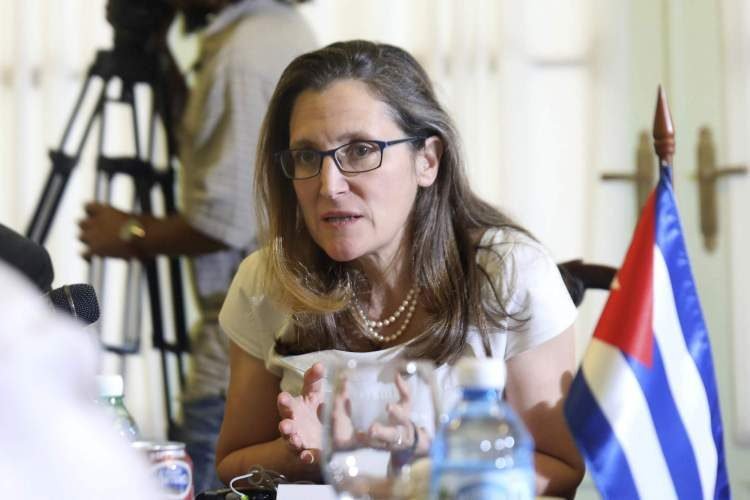Canada’s Foreign Minister Chrystia Freeland traveled to Havana this Wednesday to meet with her Cuban counterpart, Bruno Eduardo Rodríguez, and discuss the Venezuelan crisis, as well as the entry into force of Title III of the U.S. Helms-Burton Act.
The Freeland and Rodríguez meeting will be the third the two foreign ministers have been holding on Venezuela since May and is taking place parallel to the intensification of Ottawa’s contacts with the United States on the situation in the South American country.
Although both Canada and the U.S. have pointed out that Venezuelan President Nicolás Maduro has to abandon power for the country’s democratization, Freeland omitted this last requirement in a statement released this Tuesday.
“There is an international convergence around the need for a peaceful transition in Venezuela that results in free and fair elections and the return to democracy,” Freeland said.
“Canada has a longstanding relationship with Cuba, and this week’s visit will allow us to build on previous conversations held in Havana and Toronto,” Freeland added.
The other issue that Freeland will deal with Rodríguez is the entry into force of Title III of the Helms-Burton Act.
The first Freeland and Rodríguez meeting on Venezuela took place on May 16 in Cuba, while the second one was held on June 7 in Ottawa.
In addition, on August 1, U.S. special envoy for Venezuela Elliott Abrams traveled to the Canadian capital a day after President Donald Trump declared that he was considering blockading Venezuela.
Although the Canadian authorities refused to provide details about Abrams’ visit, which was revealed only by the U.S. Department of State, sources consulted by EFE noted that Washington’s strongman for Venezuela held meetings with “senior officials” of the Canadian Ministry of Foreign Affairs.
Among the officials who met with Abrams was Freeland, who was officially traveling to Europe on that day.
Following his meeting with Canadian representatives, Abrams stated that the United States and Canada were working together to bring the European Union (EU) closer to the positions of the two North American countries.
The EU has refused to recognize opposition leader Juan Guaidó as the interim president of Venezuela, as Ottawa and Washington have done, as well as the imposition of sanctions on the Maduro government.
Abrams was also pessimistic about the outcome of the negotiations between Canada and Cuba regarding Venezuela: “We wish them luck,” Abrams told Canada’s CBC.
In June, Freeland had declared that Cuba has “a role to play” in the future of Venezuela.
Canada says Cuba has “a role to play” in the future of Venezuela
“It is something that I have discussed extensively with Minister Rodríguez today. It has been a productive conversation and we are committed to keeping this dialogue open,” Freeland added.
After Abrams’ trip, on August 22 U.S. Secretary of State Mike Pompeo met with Canadian Prime Minister Justin Trudeau and Freeland in Ottawa to discuss, among other issues, the Venezuelan crisis.
Canada has met in recent months with Canadian companies operating in Cuba and that are affected by the Helms-Burton Act to reaffirm Ottawa’s commitment to defend their interests.











Chrystia Freeland cannot be trusted. She is a Russia-hating cold warrior who would fit comfortably with the previous Canadian government of the right-wing Harper Conservatives. She is a leader of the so-called “Lima Group” campaigning to overthrow Venezuela’s government. She is rightly regarded by Washington as almost a U.S. agent; let’s hope the U.S. permits her to maintain Canada’s generally friendly relations with Cuba.
P.S. “both Canada and the U.S. have pointed out that Venezuelan President Nicolás Maduro has to abandon power for the country’s democratization”
— “pointed out” means the proposition is accepted as fact. I hope this is merely a translation error.